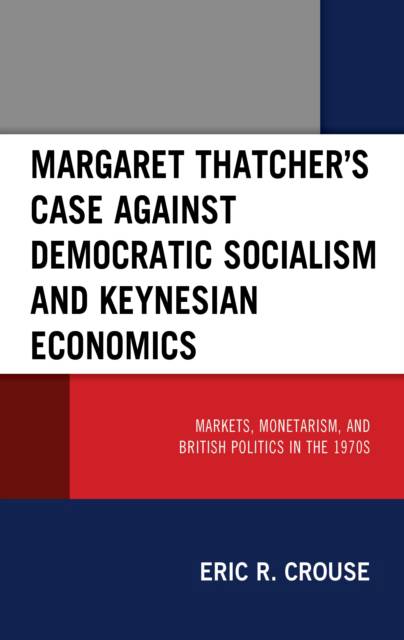
Bedankt voor het vertrouwen het afgelopen jaar! Om jou te bedanken bieden we GRATIS verzending (in België) aan op alles gedurende de hele maand januari.
- Afhalen na 1 uur in een winkel met voorraad
- In januari gratis thuislevering in België
- Ruim aanbod met 7 miljoen producten
Bedankt voor het vertrouwen het afgelopen jaar! Om jou te bedanken bieden we GRATIS verzending (in België) aan op alles gedurende de hele maand januari.
- Afhalen na 1 uur in een winkel met voorraad
- In januari gratis thuislevering in België
- Ruim aanbod met 7 miljoen producten
Zoeken
Margaret Thatcher's Case Against Democratic Socialism and Keynesian Economics
Markets, Monetarism, and British Politics in the 1970s
Eric R Crouse
Hardcover | Engels
€ 186,95
+ 373 punten
Omschrijving
Britain experienced two stunning developments in the late 1970s. Post-war Keynesianism and big government fell out of favor, and, for the first time, British voters chose a female prime minister. When Margaret Thatcher became leader of the Conservative Party in 1975, she was the first leader to oppose the consensus views of both the Labour Party and centrist Tories who, in varying degrees, accepted Keynesianism and state ownership of industry. With her traditional conservatism stretching back to her childhood years and her receptiveness to free-market arguments that revealed the economic shortcomings of Keynesianism and socialism, she developed a strong case against government management of the economy. The author explains that Thatcher's fight for economic change had both dramatic and subtle stages. In the end, the issue of inflation altered British economics and politics and Thatcher was there to take advantage of the moment and score a victory over "socialism."
Specificaties
Betrokkenen
- Auteur(s):
- Uitgeverij:
Inhoud
- Aantal bladzijden:
- 184
- Taal:
- Engels
Eigenschappen
- Productcode (EAN):
- 9781793650177
- Verschijningsdatum:
- 11/11/2021
- Uitvoering:
- Hardcover
- Formaat:
- Genaaid
- Afmetingen:
- 152 mm x 229 mm
- Gewicht:
- 417 g

Alleen bij Standaard Boekhandel
+ 373 punten op je klantenkaart van Standaard Boekhandel
Beoordelingen
We publiceren alleen reviews die voldoen aan de voorwaarden voor reviews. Bekijk onze voorwaarden voor reviews.









